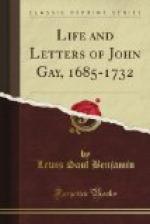* * * * *
Gay, of course, expected some reward for this courtier-like attention to the son of the Prince and Princess of Wales, and the poet and his friends again believed that his future was assured when they heard that Her Royal Highness had said, or at least was reported to have said, that she should “take up the hare”—an allusion to the “Fable” of “The Hare and Many Friends":—
A Hare who in a civil way,
Complied with ev’ry thing, like
Gay,
Was known by all the bestial train,
Who haunt the wood, or graze the plain.
Her care was never to offend.
And ev’ry creature was her friend.
On June 12th, 1727, George I. died, and Gay felt sure that at last the hour had struck when the “place” so long and diligently sought, would be bestowed on him. The new Queen did not, indeed, forget him; she did what in his eyes was far worse, she offered him the sinecure post of Gentleman Usher to the Princess Louisa,[15] then two years old, with a salary of L200 a year. Gay’s disappointment was bitter, and for a person usually so placid, his indignation tremendous. What ground for hope he had had, he, as Dr. Johnson has said, “had doubtless magnified with all the wild expectation and vanity,"[16] “The Queen’s family is at last settled,” Gay wrote bitterly to Swift on October 22nd, “and in the list I was appointed Gentleman Usher to the Princess Louisa, the youngest Princess, which, upon account that I am so far advanced in life, I had declined accepting, and have endeavoured, in the best manner I could, to make my excuses by a letter to her Majesty. So now all my expectations are vanished and I have no prospect, but in depending wholly upon myself and my own conduct. As I am used to disappointments I can bear them, but as I can have no more hopes I can no more be disappointed, so that I am in a blessed condition."[17] Pope, than whom no man loved Gay better, could not bring himself to sympathise with his irate brother poet.
ALEXANDER POPE TO JOHN GAY.
October 6th, 1727.
“I have many years ago magnified, in my own mind, and repeated to you, a ninth beatitude, added to the eight in the Scripture: “Blessed is he who expects nothing, for he shall never be disappointed. I could find in my heart to congratulate you on this happy dismission from all Court dependance. I dare say I shall find you the better and the honester man for it many years hence; very probably the healthfuller, and the cheerfuller into the bargain. You are happily rid of many cursed ceremonies, as well as of many ill and vicious habits, of which few or no men escape the infection, who are hackneyed and trammelled in the ways of a Court. Princes, indeed, and Peers (the lackies of Princes) and Ladies (the fools of Peers) will smile on you the less; but men of worth and real friends will look on you the better. There is a thing, the only thing which kings and queens




